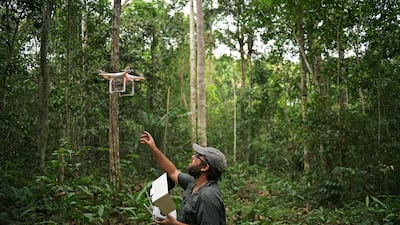Amid last week's furore over the Trump administration's release of a major climate-change assessment that predicts dire consequences for the world's health and economy, lies an equally urgent matter: biodiversity and its current decline.
Put succinctly, biodiversity is nature: animal and vegetable, great and small, every single living thing. The more diversity there is in nature, the better off we all are. Conversely, declining levels of diversity are a cause for alarm.
Forests keep our air breathable, our drinking water clean and absorb carbon emissions. The oceans absorb heat on a massive scale. The more life that our seas and green spaces host, the more effective they are at those tasks.
Threats such as wildfires, floods, droughts and food shortages are at their lowest when nature’s integrity is at its strongest. Agriculture is most productive, too, when the principle of biodiversity is applied. Healthy soil is good for crops, as well as other forms of life. Medicine that saves us from illness and infection is also derived from a diverse number of species.
Across the world’s most significant natural habitats, from the Antarctic to the Amazon, the deserts of Arabia to the Great Lakes of North America, we must work harder to let life exist with as little interference as possible.
The latest Protected Planet Report, presented at the UN Biodiversity Conference now being held in Sharm El Sheikh in Egypt, reveals that since 2016 there has been a 0.2 per cent rise in protected terrestrial areas and a 3.2 per cent increase marine ones.
Those figures may sound tiny, but they mean that a total of 15 per cent of the world’s land and seven per cent of its oceans are now safeguarded by conservation measures. Such measures are, however, a work in progress. Nature does not work in silos, therefore, creating an interconnected web of protected areas will achieve far more than spreading them out, individually, across geographically disparate areas.
We must also be more ambitious in our efforts to look after the planet. This applies particularly to the Middle Eastern region, which, in this respect, lags behind much of the rest of the world. Great strides are, however, being made in the UAE, with areas such as the Al Wathba Wetland Reserve in Abu Dhabi now on a global list of protected areas.
While they must be empowered to make their own efforts to protect the environment, developing countries would also benefit greatly from a shift in attitude from industrialised nations that benefit from their abundant natural resources.
As the National Geographic Society’s explorer-in-residence Enric Sala explained to me when we met in Dubai recently, in order to save the planet and ourselves, we need half of the earth to be in its natural state.
Mr Sala has dedicated his life to conservation, particularly that of oceans. He evidently finds the work deeply rewarding, saying that he feels like a rich man without any money. We don’t need to copy him exactly, but his mission should awake in all of us an awareness of the importance of preserving the natural world.
Mr Sala believes that our happiness and wellbeing is inextricably linked to the diversity of life on earth. As we pursue material success and better standards of living, we must also remember to value the many riches of the natural world. In this sense, understanding the importance of biodiversity requires us to reconsider what wealth truly means. Also, if we generally agree that a more diverse society makes our lives richer, then it should be obvious that ensuring nature’s diversity would do the same.
On a corporate and international level, there is much work to be done. As individuals, however, we can make immediate changes. There are a number of measures that we can take to limit our impact on the world around us.
One example might be making the choice to eat less meat. In recent years, humanity’s appetite for animal protein has become so large that the vast majority of mammals and birds on earth is made up of livestock – namely cows and chickens. Vast tracts of land are also used to feed them. Imagine the range of species that could thrive, even if only a fraction of this green space were left to grow wild.
I'm not about to advocate for hardline vegetarianism. As a great lover of hamburgers, that would be difficult for me to do. However, the fortunate thing is that just cutting down on the amount of meat we eat can have an impact. In fact, the best option is probably to make a decision to consume less overall. In addition to protecting the environment, by buying and throwing away less stuff, we will have more money, which in turn will make us safer and more secure. It's a virtuous circle that neatly mirrors that of nature itself.
Mustafa Alrawi is an assistant editor-in-chief at The National


